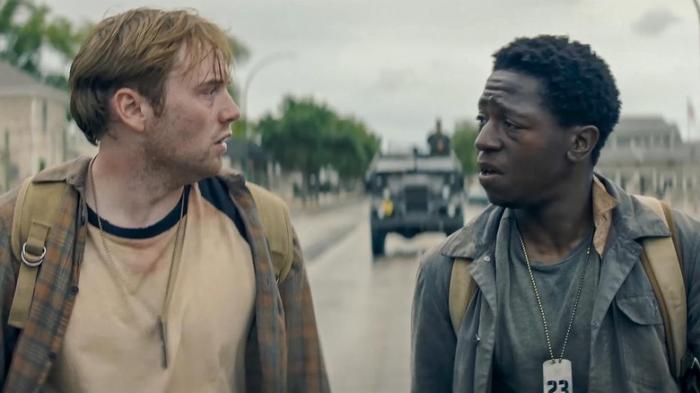By Dustin Rowles | Film | September 12, 2025

The Long Walk was the first novel Stephen King wrote, as a freshman at the University of Maine in 1967. He published it under his pseudonym Richard Bachman in 1985, and not only can you trace the influence of The Long Walk on The Hunger Games, Squid Game, and countless other projects since, but the premise also feels relevant to almost any era in post-World War II America, and probably even before. The Long Walk is wide open to interpretation, but in both reading the novel and watching Francis Lawrence’s film adaptation, I couldn’t help but think of the epidemic of mass shootings in America, especially in schools and on college campuses.
The premise is simple, which makes it so adaptable. In an “alternate dystopian” America (that often doesn’t feel so “alternate”), fifty teenagers “win” a lottery to “compete” in The Long Walk. Beginning in Northern Maine, the kids walk until only one remains. If you stop, you “get your ticket” — a bullet to the head. There are no stops. No bathroom or sleep breaks. There is rain, heat, cold, and hilly terrain (and for those of us who live in Maine, not a familiar site in the whole film, which was shot in Garson, Manitoba, Canada). You must maintain a pace of 3 mph. Slow down and you get a warning. Three warnings in three hours, and you’re shot. Step off the pavement, you’re shot. It’s all overseen by The Major (played here by Mark Hamill at his evil authoritarian best).
That’s it. The power of The Long Walk, though, resides in the relationships the boys form, especially Ray Garraty (Cooper Hoffman, son of Philip Seymour) and Peter McVries (David Jonsson). They learn about each other, and about what The Long Walk means to them, over the days and miles they endure together. They bond. They become brothers. It echoes those relationships developed over the course of Stand By Me, except that here, only one can ultimately survive.
It’s undoubtedly a bleak film, but there’s hope in its themes. A friend gets shot, and you just keep walking. You keep living. Or as Stephen King wrote in The Shawshank Redemption, borrowing from Bob Dylan: “Get busy living or get busy dying.” Because you have no choice, until you do.
But what’s it all for? That’s where the quiet hope of The Long Walk lies: these boys, in their final days, must live in the moment — the very moment, on the pavement, with each other. And isn’t that life? Living one moment to the next, even if it sometimes means blocking out the misery around us. We’re all going to get our tickets punched — some violently, some naturally, some by our own hand — but there’s beauty in our families, in the relationships we forge, in acts of kindness large and small, and in the sacrifices of others who help us continue on our own long walks.
When we left the theater, my son turned to me and said, “That was the best movie for 2025.” Not of the year, but for the year. And while I couldn’t disagree, it was hard not to note that it could be the movie for any number of years. But it feels so pressing, so immediate now — maybe more so for my son, whose walk nearly ended four years ago. But we trudge on, and we savor the moments, knowing that The Long Walk could just as easily be the best movie for next year, or the one after, or any other year our walk continues.